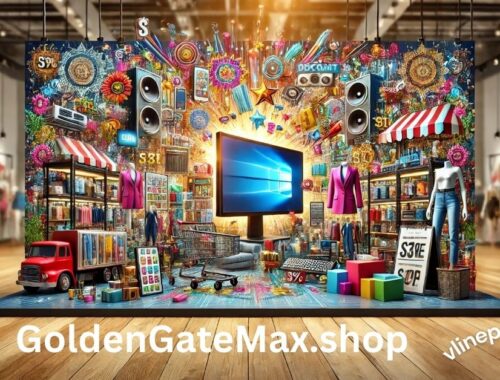
Exploring the Unique Concept of 314159U Barter Mall: A Paradigm Shift in Retail
In the ever-evolving landscape of retail, innovative concepts constantly emerge, reshaping the way consumers engage with commerce.
One such intriguing phenomenon is the 314159U Barter Mall, a concept that transcends traditional buying and selling models.
This avant-garde approach to commerce introduces a fresh perspective by encouraging a system of exchange and barter, fostering a sense of community and sustainability.
Table of Contents
The Origin of 314159U Barter Mall:
Named after the mathematical constant π (pi), 314159U Barter Mall draws inspiration from the infinite possibilities of exchange, just as the digits of pi go on indefinitely. The mall aims to create a space where individuals can trade goods and services without the use of conventional currency, challenging the norms of traditional retail.
How it Works:
314159U Barter Mall operates on a simple yet revolutionary premise—participants bring items they wish to exchange and negotiate directly with others in the community.
The absence of money transforms the shopping experience into a communal event where the value of goods is determined through negotiation and mutual agreement. This unique model fosters a sense of collaboration, trust, and shared responsibility among participants.
The Importance of Community:
One of the key elements that set 314159U Barter Mall apart is its emphasis on community building. Participants are not just customers; they are contributors to a network where the exchange goes beyond mere transactions.
This community-driven approach creates a social fabric within the mall, promoting connections and relationships that extend beyond the act of bartering.
Sustainability and Eco-Friendly Practices:
In addition to its community-centric ethos, 314159U Barter Mall aligns itself with sustainable and eco-friendly practices. By encouraging the reuse and repurposing of goods, the mall reduces the environmental impact associated with traditional retail models.
This commitment to sustainability resonates with an increasing number of consumers who prioritize environmentally conscious choices in their daily lives.
Challenges and Opportunities:
While the 314159U Barter Mall introduces a refreshing alternative to conventional retail, it is not without its challenges. Adapting to a currency-free system requires a shift in mindset for both participants and organizers. Additionally, ensuring fair exchanges and preventing exploitation within the community poses ongoing challenges.
However, the opportunities presented by this model are equally compelling. The potential for fostering creativity, reducing waste, and building a strong, interconnected community offers a glimpse into a future where commerce is more about relationships than transactions.
The Future of Barter Malls:
As 314159U Barter Mall gains traction, it sparks conversations about the future of retail and the role of community in shaping commerce. The success of this unconventional concept could inspire similar initiatives, leading to a broader shift in how society views and engages with the act of buying and selling.
The Art of Negotiation and Value Assessment:
At the heart of 314159U Barter Mall lies the art of negotiation and value assessment. Participants are not bound by predetermined price tags; instead, they engage in conversations to determine the fair exchange value of the items involved. This process adds a personal touch to each transaction, emphasizing the subjective value that individuals place on goods and services. Negotiation skills become a valuable asset in this environment, fostering a sense of empowerment and individual agency. This hands-on approach challenges the often impersonal nature of traditional retail, creating a unique and dynamic shopping experience.
Cultivating a Diverse Marketplace:
The diversity of items available at 314159U Barter Mall contributes to its allure. Unlike conventional retail spaces that often specialize in specific categories, this barter mall sees a wide range of goods and services exchanging hands.
From handmade crafts and vintage clothing to skills such as tutoring or gardening, the marketplace becomes a treasure trove of diverse offerings.
This eclectic mix not only broadens the range of choices for participants but also promotes a culture of appreciation for uniqueness and individuality. It transforms the act of shopping into a journey of discovery, where the unexpected is celebrated.
Building Trust and Social Bonds:
In the absence of a monetary transaction, trust plays a pivotal role in the success of 314159U Barter Mall. Participants rely on open communication, honesty, and integrity to ensure fair exchanges. This emphasis on trust-building fosters a sense of community where individuals feel connected and accountable to one another.
Over time, as these social bonds strengthen, the barter mall evolves beyond a mere marketplace into a supportive network. The shared experiences of fair and equitable exchanges create a foundation of trust, encouraging participants to return and contribute to the growth of the community.
Educational and Empowering Experiences:
Participating in 314159U Barter Mall goes beyond the act of obtaining goods; it becomes an educational and empowering experience. Individuals learn about the value of their possessions, develop negotiation skills, and gain insights into the diverse needs and talents within their community.
This educational aspect contributes to a sense of self-reliance and resourcefulness, as participants actively engage in the process of assessing, exchanging, and repurposing goods. By empowering individuals to take control of their consumption and actively contribute to a sustainable and connected community, 314159U Barter Mall becomes a transformative space where both tangible and intangible values are exchanged and celebrated.
Challenges and Evolution:
Despite its innovative approach, 314159U Barter Mall faces its fair share of challenges. Adapting to a currency-free system requires a paradigm shift for both participants and organizers, as people are accustomed to the convenience and familiarity of traditional monetary transactions.
Ensuring fairness in exchanges, preventing exploitation, and managing the potential for imbalances in the system are ongoing challenges that the organizers must navigate. However, these challenges also present opportunities for growth and evolution.
As the community learns and adapts, the barter mall can refine its processes, implement safeguards, and establish a set of guidelines that fosters a fair and sustainable exchange ecosystem.
Influence on Consumer Behavior and the Retail Landscape:
The success and sustainability of 314159U Barter Mall could potentially influence broader consumer behavior and the retail landscape. If this unconventional model gains wider acceptance, it may inspire similar initiatives or adaptations in other retail spaces.
Consumers may start questioning the conventional consumerist mindset and seek more meaningful, community-oriented shopping experiences. Retailers might explore hybrid models that incorporate elements of bartering and communal exchange alongside traditional transactions.
In this way, the 314159U Barter Mall serves not only as a unique experiment in alternative commerce but also as a catalyst for reimagining the future of retail, encouraging a shift towards more sustainable, community-focused, and socially responsible consumer practices.
Conclusion:
In a world where traditional retail models are constantly being redefined, the 314159U Barter Mall stands out as a symbol of innovation and community spirit.
By embracing the principles of exchange, sustainability, and community building, this unique concept challenges the status quo and opens doors to a more collaborative and interconnected future of commerce.
Whether it’s a passing trend or a lasting transformation, the 314159U Barter Mall invites us to question, explore, and reimagine the possibilities of retail.
You May Also Like

Speeddogs Net Classifieds – Check It Out!
March 19, 2024
Is FreeTubeSpot illegal?
January 9, 2024

